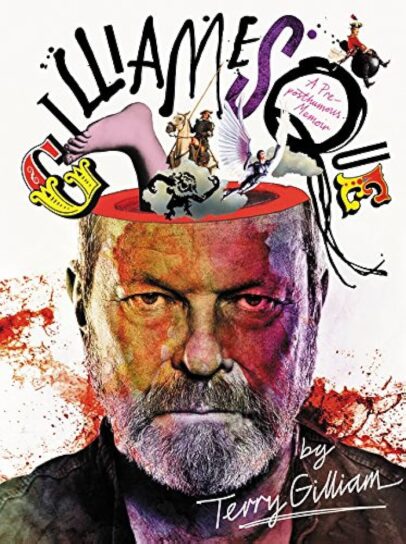By TERRY GILLIAM (Harper Design; 2015)
This “Pre-Posthumous Memoir” by the outspoken Minnesota-bred, London-based cartoonist-turned-director Terry Gilliam was published back in 2015. That means it doesn’t tell the full story, as there always seem to be new developments in the ever-evolving Gilliam saga. Since this book was published he’s completed his long gestating passion project THE MAN WHO KILLED DON QUIXOTE (2018), made quite a few Controversial Statements (so what else is new?), and been cancelled.
THE MAN WHO KILLED DON QUIXOTE (2018) Trailer
Gilliam makes a standard autobiographical error in these pages, in which he spends far too much time describing his early years. I can appreciate the need to enumerate his formative influences, but he’d have been well advised to do so in a more economical manner. Gilliam’s detailing of his childhood (marked by a move to California at age 11) and education at LA’s Occidental College (apparently the “Princeton of the West”) contain little in the way of drama, with Gilliam readily admitting, “that’s probably why I had to go into filmmaking—to acquire the deep emotional and spiritual wounds which my shockingly happy childhood had so callously denied me.”
See Also DOCUMENTING TERRY GILLIAM
In keeping with the over-focus on his pre-filmmaking existence, Gilliam provides plenty of detail about his years as a cartoonist for a variety of underground publications, his National Guard service, his employment in a Los Angeles advertising agency alongside future critic Joel Siegel, and his involvement in a Century City police riot that precipitated his late 1960s defection to London. It was there, in 1968, that Gilliam joined the Monty Python crew, with Gilliam doing the animated portions of the long-running sketch series MONTY PYTHON’S FLYING CIRCUS and-co-directing the first Python feature MONTY PYTHON AND THE HOLY GRAIL (1975), followed by his premiere solo directorial effort JABBERWOCKY (1977).
MONTY PYTHON AND THE HOLY GRAIL (1975) Trailer
And so it is that, well past the book’s halfway point, Gilliam finally gets around to filing us in on his moviemaking ventures, which include astonishing fantasy-infused epics like TIME BANDITS (1981), THE ADVENTURES OF BARON MUNCHAUSEN (1989), THE FISHER KING (1991) and TIDELAND (2005). Unfortunately, by this point he’s already used up so much ink on his earlier exploits there’s not enough space left; it’s BRAZIL (1985) that of all his films gets the most extensive coverage, followed by the Gilliam directed short that opens MONTY PYTHON’S THE MEANING OF LIFE (1983) and 12 MONKEYS (1995). It would have been nice to have a bit more info on Gilliam’s experiences with Harvey and Bob Weinstein on THE BROTHERS GRIMM (2005) or his helming of THE IMAGINARIUM OF DR. PARNASSUS (2009) prior to the untimely death of its star Heath Ledger (because as it is Gilliam concentrates solely on what happened afterword).
MONTY PYTHON’S THE MEANING OF LIFE (1983) Trailer
12 MONKEYS (1995) Trailer
Please understand that despite all my griping, I heartily recommend GILLIAMESQUE. Structurally lopsided it may be, but the book is attractively designed in a wholly distinct manner that fully justifies its title, incorporating copious handwritten asides, cartoons and vintage photos. It’s also drafted in an erudite and engaging manner that matches Gilliam’s public persona (it’s not at all difficult imagining Gilliam’s inimitable quasi-British accented voice reciting the text).
Plus, GILLIAMESQUE contains many intriguing showbiz tidbits that to my knowledge have never been aired before. They include Stanley Kubrick asking Gilliam to do an animated title sequence for A CLOCKWORK ORANGE (which obviously never came to pass); becoming so fed up with the attention-hogging antics of Hunter S. Thompson at the New York premiere of FEAR AND LOATHING IN LAS VEGAS (1998) that Gilliam and the film’s cinematographer Nicola Pecorini left early (“Hunter was a weird one—I admired him enormously, but he was best appreciated at a distance”); and discussing the possibility of having Harvey Weinstein back THE BROTHERS GRIMM with Martin Scorsese, who allegedly told Gilliam that “It’s a horrible experience, but if it’s the only way for you to make the film, you’ve got to do it.” Given what we now know about Weinstein (but didn’t when GILLIAMESQUE was initially published), I’d say that proves Scorsese is not a good person to go to for filmmaking advice and that Gilliam’s decision-making abilities are open to question. What else is new?

